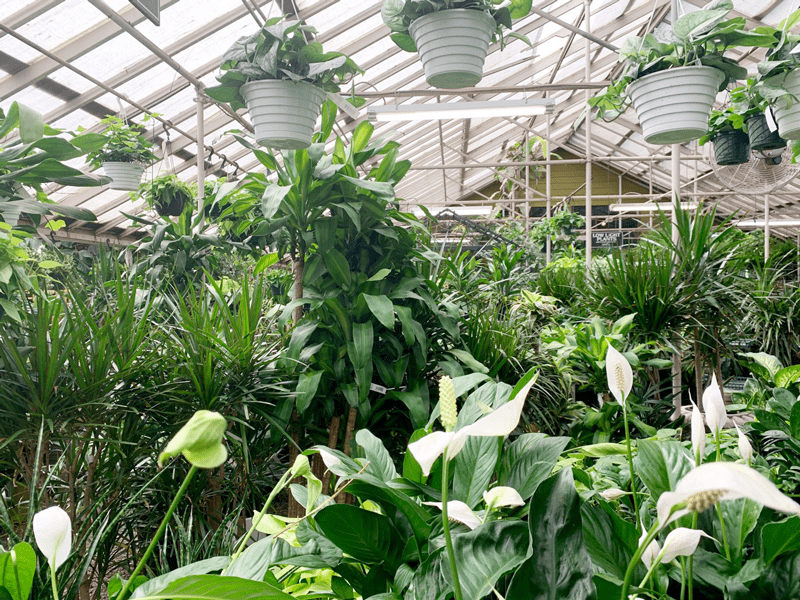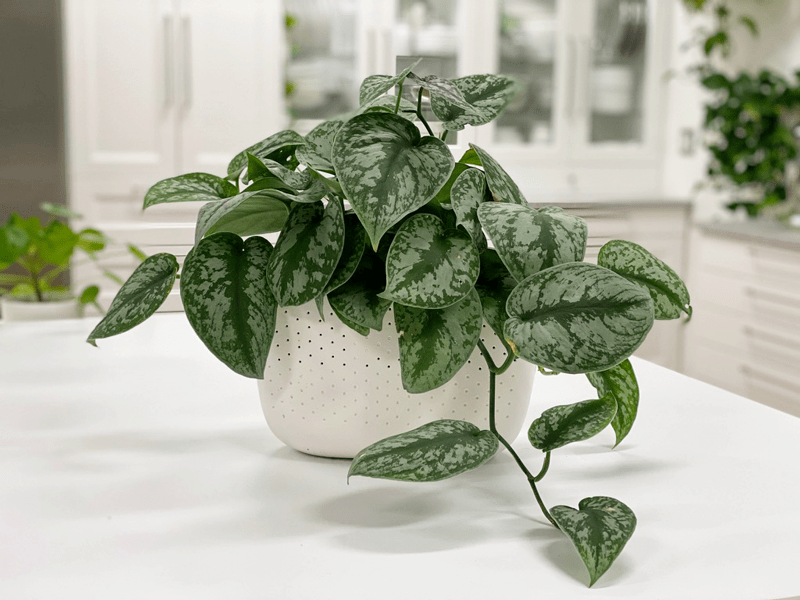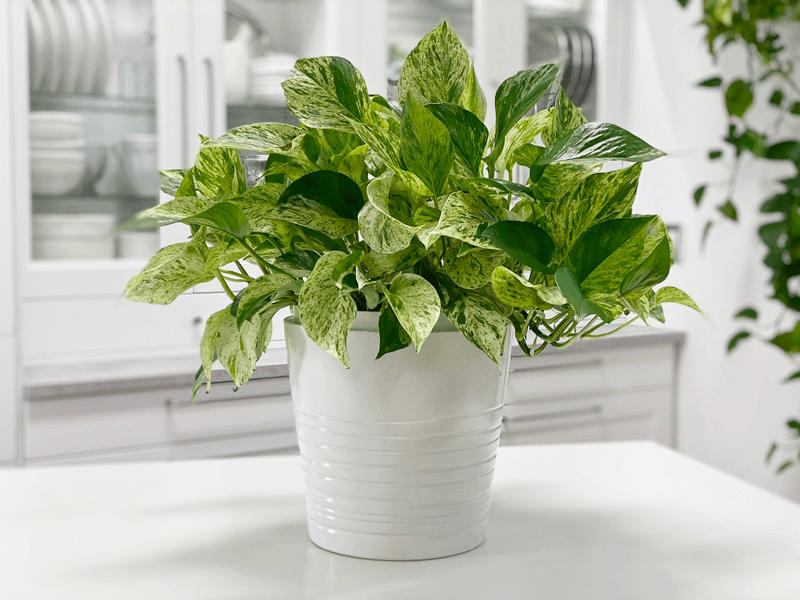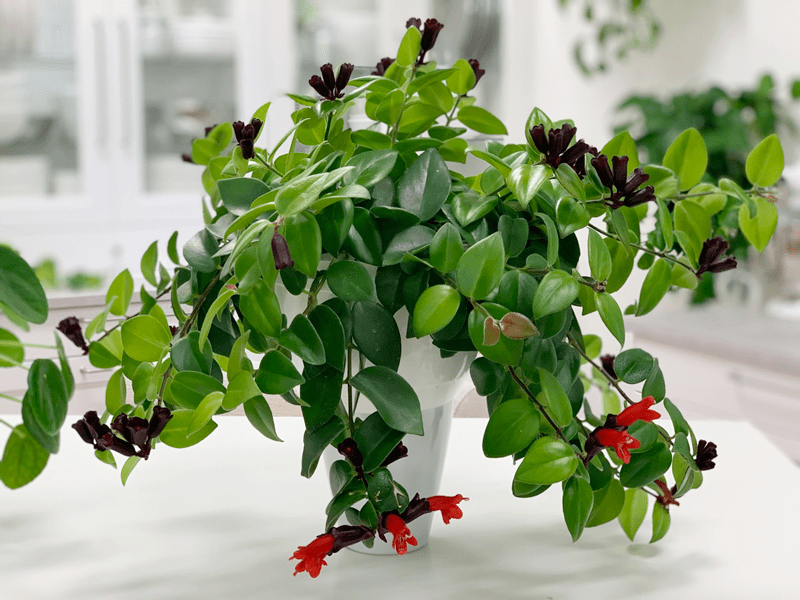Where to Purchase Houseplants

 Add to favorites
Add to favorites
As houseplants continue to soar in popularity, there are more and more places to buy them, and yet certain specimens still seem ridiculously hard to find. So, I thought I would sit down and share my plant shopping experiences with you.
Grocery Stores
Most grocery store chains carry houseplants in their floral departments. Inventory will be all over the board, so check out all the grocery stores in your area. Every time I go to the grocery store, I can’t resist visiting the houseplant section. Bless Bob’s heart…he usually says to me, “You better go check out the plants while I get some potatoes.” He’s a plant-daddy and doesn’t even realize it. It’s a good idea to find out when the floral department gets their new plant shipments; that way, you can have a chance to get first pick.
Pros
- Most of the time, prices are very reasonable. BUT some stores like to put them in decorative pots and slap a bow on them, which doubles the price. I have asked in the past if I could purchase the plant and leave the pot behind (expecting I would get a better deal on the plant itself). I was denied, so I moved on to my regular grocery shopping schedule, looking at kale and celery (which was really on the shopping list).
- Plants tend to be on the smaller side; this can be a bad thing if you don’t have patience.
- It’s convenient to look at houseplants when shopping for groceries. But this could be a con if you are a compulsive plant purchaser.
- Keep your receipt, and if the plant declines quickly once at home, you should be able to return it without any issues. It’s always good to find out what their return policies are.
Cons
- Plants may not get the care that they require, including individual proper watering schedule (most plants end up being overwatered) or adequate light.
- The staff for the floral department may not be as educated with houseplants, so go in armed with knowledge.
- Infestations of plant pests may go undetected. ALWAYS inspect any plant you are tempted to bring home, no matter where you are shopping.
- The selection is likely small and limited.
- They usually don’t have the plant names on the pots, so if you don’t know much about plants, you could be setting yourself up for a real struggle.

Plant Nurseries
If you are lucky enough to have a plant nursery in your area, check to see if they carry houseplants. Not all do; many of them focus on outdoor plants/trees/gardening. Plant nurseries that concentrate on houseplants have the perfect environment for the plants they carry: light, scheduled watering, and humidity. When you remove a plant from the “perfect environment,” it can show signs of transitioning stress when you first bring it home. A plant will always require time to adjust to its new living quarters, so be patient and don’t freak out (been there, done that).
Pros
- If a plant nursery carries indoor houseplants, they should be more educated about the plants they sell. I find this important because not only can they answer any questions you may have, but they should be taking better care of the plants that are waiting to sell.
- Hopefully, they keep a close eye on pest infestations. Be aware that most nurseries pack their plants in, which creates a bridge of leaves to pass pests from plant to plant.
- Plant nurseries carry larger plants, which are good for those who don’t have the patience to wait for a plant to grow.
- They carry a wider variety.
Cons
- If the nursery’s focus is more on outdoor plants, but they carry indoor houseplants, they may not keep a close eye on the health of all the plants.
- Depending on the size of the houseplant department, a lot of plants can end up overwatered. When you bring a plant home, check the soil moisture. Many times, the plant will need a break from watering until the soil starts to dry out, which will help to avoid future issues.
- Sometimes too much variety overwhelms a person. If this is you…take a deep breath and enjoy the process, as if you were in a jungle retreat. Sip a coffee or iced tea, stroll, and enjoy yourself.
Hardware Stores
Checking out the indoor plant section can be a great “babysitter” for you while your spouse shops for plumbing supplies–unless you are into plumbing supplies too; then you may have to divide your time. So far, due to living in a small town, I have to drive anywhere between 30-60 minutes to reach a Home Depot or Lowe’s Hardware Store. Home Depot is a hit and miss, which typically results in many misses. Lowe’s, on the other hand, tends to have a larger selection and healthier plants. This may differ in your region.
I find a lot of suffering plants in these stores. They usually don’t have employees working that department all day. Plant pests are something you MUST watch out for! Don’t be tempted to bring home suffering plants, unless you want the challenge. If you take on this challenge, insist on a discount.
Pros
- It’s a good way to get plants locally if you’re on a tight budget.
- Great place to hang out if your partner is looking for other items that aren’t of interest to you.
- Some stores carry large plants, making them far more affordable if you are in the market for a big plant.
- They usually have a 30-day or more return policy. Double-check the store policy.
Cons
- Try to pounce on them as soon as they come into the shop, as most stores give plants no attention or appropriate watering once they’re on the shelves. Overwatered plants can really suffer. Always ask when their new shipments come in.
- Labeling is hit and miss, to say the least. If you don’t know your plants, you could end up with a plant that requires care that you can’t give it (bright light, daily mistering, continuous watering, etc.).
- Often, these plants are potted in poor quality compost–or sometimes the wrong compost entirely–so consider repotting plants as soon as you get them home.
- It’s hard to find employees who are knowledgable about the plants they carry. Don’t expect much in the line of guidance.
IKEA
Whaaa? IKEA? Yep. You heard me correctly. We have an Ikea in Portland, Oregon, and I love to shop in their plant section whenever we are in the area. I had no idea that they sold plants, real plants (!) until we remodeled my Studio Kitchen with IKEA kitchen cabinets. You can read more about that (here).
Pros
- Their plants are priced very affordably. Part of the reason IKEA manages to keep prices so low is that they source plants from local suppliers whenever possible. In the US, most of the plants come from Florida; in Europe, most plants come from the Netherlands. Because of this strategy, inventory may also be dictated by weather in those areas.
- This supply constraint is great for the economy but can limit selection.
Cons
- Their stock is limited. When fully stocked, it looks lush, but the variety is minimal.
- If their stock doesn’t rotate quickly, the plants can start to suffer. If you’re looking for something FRESH, new, unique, or seasonal, stop by IKEA’s plant department quarterly. The superstore lines the shelves with new offerings in February, April, August, and October.
- IKEA doesn’t accept returns or exchanges on plants, even if it died soon after you bought it.
- IKEA isn’t in every town.

Local Plant Swaps
I never knew that such a thing existed, but I am not surprised…there are meetups for everything these days. Check to see if such a thing exists in your neighborhood. It’s a new nonprofit project that’s free for everyone. They have map-based listings that make it easy to find local swaps and connect with other nearby enthusiasts.
Pros
- Plant swaps are a great way to get integrated into your community, create new friends, and surround yourself with like-minded people instead of a spouse who groans when you walk into the door with yet ANOTHER plant.
- Since the plants are coming from previous owners, the chances are that the plant will be healthy, free of pests, and will come with a history.
- You have a chance to speak to the grower and ask them all the “required care” needed for the plant that you are interested in buying.
Cons
- Many plant swaps consist of plant propagations; therefore, a bit of knowledge about plant propagation is useful, if not required, in order to successfully grow your new finding.
- It requires a person to be a little social. If you don’t like social environments, this may either be a horrifying challenge or an opportunity to expand yourself.

Facebook Virtual Garage Sales / Craigslist
I have purchased a handful of plants through this venue. I have had good and not-so-good experiences. I bought a massive snake plant from a woman who lived an hour and a half away. The plant was huge and beautiful. I couldn’t believe that she wanted to part with it. When I asked her why she was selling it, she broke down in tears. I felt so bad. She assured me she was okay. She proceeded to share that her husband had recently passed away, and she had to sell stuff to make ends meet.
I reached out and just hugged her. She held me tight as she cried. It was an emotional release for her, and she left feeling lighter as if a weight had lifted. She then shared that she had worked as a nanny, and a little boy that she cared for gave her the snake plant as a gift. Back then plant was tiny, single-bladed. She grew the plant for over ten years, nurturing it to the massive plant that is it today.
With a few other sales, I came home with plants that were just “okay.” Had I seen them in the store, I would have passed. BUT when I buy things from groups like this, after making scheduled meeting arrangements, the time it takes for both parties to drive to meet up, the gas money, etc. I have a hard time declining an item. It’s just who I am, and this is something I have to work on personally.
Pros
- You have a chance to speak to the grower and ask them all the “required care” needed for the plant that you are interested in buying. How long have they had it? How old is the plant? How often did they water it? Feed it? Etc. Trust me, ask these questions. They may have just fertilized it, and if you don’t know that, you might add more, thus distressing the plant.
Cons
- They might charge more for the plant, because who doesn’t want to make money on a deal?
- If you are like me, you might struggle in saying that you don’t want the plant and end up bringing home a plant that you have to give a lot of time and attention.
- You have to take time to arrange a meetup, plan where to meet, settle on a price, and then after all that…you might have to decline the sale once you see the plant in person.

Boutique or Flower Shops
You’re much more likely to find a houseplant boutique in large urban areas. Still, you just never know–occasionally, you’ll come across a florist in a small town that offers a stunning houseplant selection. We have a wonderful flower shop called Tammy’s. I love everyone who works there. They are welcoming, excited to see me (not only because I buy a lot of plants from them), but they also don’t hide, afraid of questions. They are knowledgeable about what they sell.
In fact, Bob loves to go in there to buy me a just-because-plant. They get a kick out of him. And since they are small enough to know me, they know what to send home with Bob.
Pros
- The plants probably get special attention. Small shops can’t hide shelves of dying plants in amongst other retail items; therefore, they take pride in the aesthetics of everything. Often these stores are small enough for the consumer to scan the shop in its entirety.
- Frequently, you can find the trending plants in these stores.
- You get concentrated attention /care from the salespeople.
Cons
- The houseplants may come with a higher price tag, which isn’t surprising.
- Their variety is typically limited.
Mail Order Companies
I have yet to purchase a plant online. I want to, just like I would love to be able to buy clothes online. But with both, I like to touch, inspect, and “try on.” I want to see the environment they came from.
Pros
- It’s a much larger world, and you can typically find any species of plant that you want.
- If you live in a rural place, finding any plants may be a challenge.
Cons
- Plants are temperature sensitive, so you may have to wait for the right season to roll around before ordering.
- Pricing can be all over the board.
- You never know what the plant condition will be, and returns can be tricky or unavailable.
Well, I think I armed you with some useful information. I hope you found it helpful. Please leave a comment below. Blessings, amie sue
© AmieSue.com
Tags: Indoor Houseplants


 Add to favorites
Add to favorites



